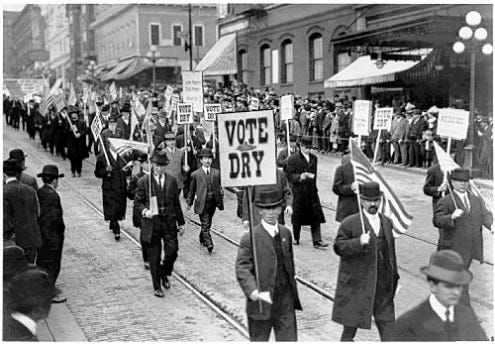Ken Burns' Prohibition

This week, PBS kicks off the premiere of Ken Burns' latest documentary on American history, "Prohibition." The nearly six-hour film is an examination of the law that led Americans to lawlessness and sparked the debate of just what kind of role government plays in the lives of the people.
Fans of Burns' projects will likely not be disappointed. The film dives into the Prohibition era and leaves not a single segment unexplored.
There are testimonials by historians, legal experts and historical figures — the most delightful being that of Supreme Court Justice John Paul Stevens — as well as writers including Pete Hamill. Actor Peter Coyote narrates the film, with special guests lending their voices to the telling of one of the country's most interesting stories. Samuel L. Jackson, Tom Hanks and Blythe Danner are a few of those who help narrate the film.
To begin, Burns wastes no time in illustrating the emotional center of the Prohibition era, which began in the 1800s, never let up during the turn of the century, reached a bloody middle during the 1920s and — as is almost suggested — saved the Depression-era nation with its final repeal.
It was the story of a husband taken with the drink, coming home to his wife and children despondent, unreasonable and even abusive that led to a movement to see alcohol abolished back in the 1800s. Alcohol, the film shows, would be blamed for all of the heartache and the destruction that was taking place inside the home. The opinion that would fuel the temperance movement was that alcohol was destroying families, stealing fathers from their children and husbands from their wives.
The movement, Burns shows, would struggle in its first efforts. As it turns out, Americans have long loved to drink — an affinity that would ultimately last.
Prohibition is a lot of things, as this film undoubtedly shows. It's a lesson in government. It's a lesson in morality. But it begins as a lesson in the power of people to create change within a democracy. The temperance movement, fueled by women who were a strong voice against the elixirs that were destroying their families, made indisputable impact on the saloons that were suddenly vilified.
Burns profiles the characters behind Prohibition for viewers in his trademark way that makes each one personal and relateable. The 18th Amendment did not come about out of discord; rather, the movement gained enough ground within political and social circles it seemed as though the entire nation had decided it needed to sober up.
And that's when Burns' film gets really good. The movement's supporters and stark opponents are interesting enough. But it is the effect Prohibition had on the streets that is fun to watch. There's Al Capone, Lucky Luciano and Bugs Moran. There is Lois Long, flapper and New Yorker columnist, a Carrie Bradshaw in her own right for the 1920s. What Prohibition did, Burns shows, was not regulate the country's alcohol consumption. It fueled it. It shaped morality — or the lack thereof — and it would leave a lasting mark on political history as a significant failure.
Broken into three parts — "A Nation of Drunkards," "A Nation of Scofflaws" and "A Nation of Hypocrites" — Burns travels everywhere from the homes of those wives desperate to abolish all alcohols to the speakeasies that multiplied in the law's wake. From the resulting surge in organized crime, mobsters suddenly had a lucrative industry dropped in their laps while the lawmakers and political leaders sneaked a few drinks themselves.
What Burns does exceptionally well is give an all-encompassing history lesson without ever getting boring. And that's true for "Prohibition." There are plenty of historical photos and film footage. There's plenty of sensational stories, heroes and villains.
In the end, we have our restrictions on alcohol, our support groups for those who have a problem with the drink. But as Burns notes: Many an organization has gone to our government with a law that would govern how we choose to live our lives. If Prohibition was anything at all, the film seems to state, it was a lesson in never repeating that mistake again.
4 Yaps


